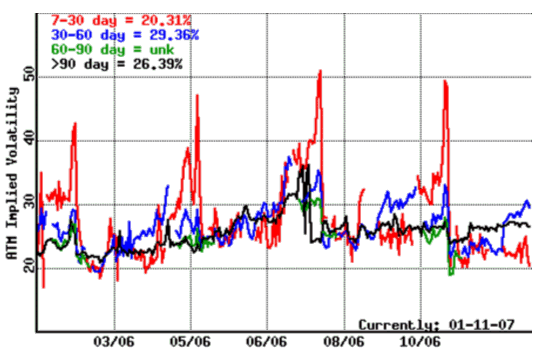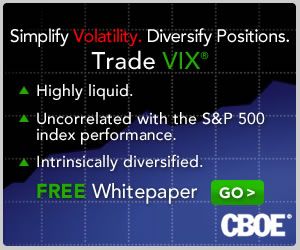Volatility: Options Expiration Cycle vs. Earnings Season
For those who wonder why VIX options prices sometimes seem to bear little resemblance to movements in the VIX, Brian Overby at TradeKing has a good article, Decoding the VIX II, that explains how VIX options prices are a function of VIX futures prices, not the underlying VIX prices. (FYI, you can find the first half of Decoding the VIX here.)
Overby discusses some of the implications of this pricing phenomenon and concludes:
Overby discusses some of the implications of this pricing phenomenon and concludes:
"This means that the relationship between the actual VIX index and the VIX options “based” on that index are little hard to follow."
While am quick to nod my head in agreement at this, his metaphor about predicting the weather four months in advance based on current data hits closer to home.
"In simple terms, trading VIX options is like trying to trade options on the temperature at some future date. If, for some odd reason, the temperature in south Florida reaches 120 degrees on October 5, that does not help someone to predict the temperature on February 5 of next year. Perhaps, if there a string of 120-degree days, then, maybe, there could be a trend that might presage a warmer winter and a higher than normal temperature on February. Under normal conditions, however, what happens to the temperature on one particular day in September bears very little relationship to what weather will be in February."
More on what this means to come, but the thoughts here might help those trying to understand some of the many idiosyncracies of the elusive VIX.
On another front, Clare White at Optionetics.com recently authored CSCO IV Seasonality, which discusses the seasonal implied volatility cycles associated with CSCO and earnings releases. Not surprisingly, graphs of CSCO IV show that IV ramps up in the weeks leading up to earnings and spikes for several days before before earnings, only to subside dramatically after the announcement. 
The implications, of course, are much broader than CSCO and include the VIX. Since the VIX is looking ahead to volatility over the next 30 days, it is important to know when the S&P500 heavyweights are scheduled to report.
For 2007, I have looked at the reporting dates, by week, for the S&P500 and come up with the following table to identify the number of companies that report each week and in each four week cycle:
Note that the week after options expirations week is at the peak of the earnings reporting season, with the most companies reporting (115), while the weeks before, during and after options expiration have a roughly equivalent number of companies in the SPX reporting during the four week window that roughly coincides with the VIX futures calculation horizon.
With these two thoughts reverberating in my head, I went back to the VIX Performance During the Options Expiration Cycle post, separated out the prime earnings reporting months (January, April, July and October) and compared them with the other eight non-earnings months. I did this for the week after expiration, which happened to show the highest volatility in my previous analysis. Sure enough, the earnings months were 50% more likely than non-earnings months to show VIX moves to the upside of 10% or 15% and more than twice as likely to show moves of 20% or more.
While the data still support the week after options expiration as the biggest volatility week, it turns out that in non-earnings months, the week after options expiration is no more volatile than average. The bottom line is that, as far as I can tell, it is the proximity to earnings releases that makes the week after options expiration more volatile than other weeks. Perhaps more importantly, in terms of the influence on volatility, earnings season trumps the options expiration cycle by a large margin.
On another front, Clare White at Optionetics.com recently authored CSCO IV Seasonality, which discusses the seasonal implied volatility cycles associated with CSCO and earnings releases. Not surprisingly, graphs of CSCO IV show that IV ramps up in the weeks leading up to earnings and spikes for several days before before earnings, only to subside dramatically after the announcement.

The implications, of course, are much broader than CSCO and include the VIX. Since the VIX is looking ahead to volatility over the next 30 days, it is important to know when the S&P500 heavyweights are scheduled to report.
For 2007, I have looked at the reporting dates, by week, for the S&P500 and come up with the following table to identify the number of companies that report each week and in each four week cycle:
| Week | Current Week | Current + 3 Weeks |
| Week 1 2007 | 2 | 166 |
| Week 2 2007 (-1) | 4 | 262 |
| Week 3 2007 (opt exp) | 45 | 307 |
| Week 4 2007 (+1) | 115 | 282 |
| Week 5 2007 | 98 | 202 |
| Week 6 2007 | 49 | 104 |
| Week 7 2007 | 20 | 55 |
Note that the week after options expirations week is at the peak of the earnings reporting season, with the most companies reporting (115), while the weeks before, during and after options expiration have a roughly equivalent number of companies in the SPX reporting during the four week window that roughly coincides with the VIX futures calculation horizon.
With these two thoughts reverberating in my head, I went back to the VIX Performance During the Options Expiration Cycle post, separated out the prime earnings reporting months (January, April, July and October) and compared them with the other eight non-earnings months. I did this for the week after expiration, which happened to show the highest volatility in my previous analysis. Sure enough, the earnings months were 50% more likely than non-earnings months to show VIX moves to the upside of 10% or 15% and more than twice as likely to show moves of 20% or more.
While the data still support the week after options expiration as the biggest volatility week, it turns out that in non-earnings months, the week after options expiration is no more volatile than average. The bottom line is that, as far as I can tell, it is the proximity to earnings releases that makes the week after options expiration more volatile than other weeks. Perhaps more importantly, in terms of the influence on volatility, earnings season trumps the options expiration cycle by a large margin.


5 comments:
Bill,
I really enjoy your writings on the VIX. I use it in a BIG way for my Options trading and like you feel that the 13+ level is a critical point to market direction. I also look at specific IV for the underlying stock I am trading Options against. I will continue to come back and stay tuned to your writings. I hope you come by my site from time to time to read what I am up to as well as post a comment or idea.
http://optionstheeasyway/blogspot.com
Thanks for the kind words. I've been focused almost exclusively on equities for the past few years and have never really focused on options, the VIX or IV in general until recently. I have no idea which path this blog may take in the future, but with positive feedback like yours I guess I'll just have to make it up while I go along.
FWIW, I enjoy your blog as well and will definitely provide some feedback in the future.
Cheers and good trading!
-Bill
source importante Louis Vuitton Dolabuy cliquez pour plus d'informations Dior Dolabuy cliquez sur le site dolabuy hermes
b9g84s7m22 j6v62o5e04 p1s17a3z28 y5p39n0e39 s3w27e6w65 s1d44m2j77
buy replica bags online f67 d1u75j3w89 best replica designer bags n48 j9g26s4c52 buy replica bags h35 p1i26z2i98
Post a Comment